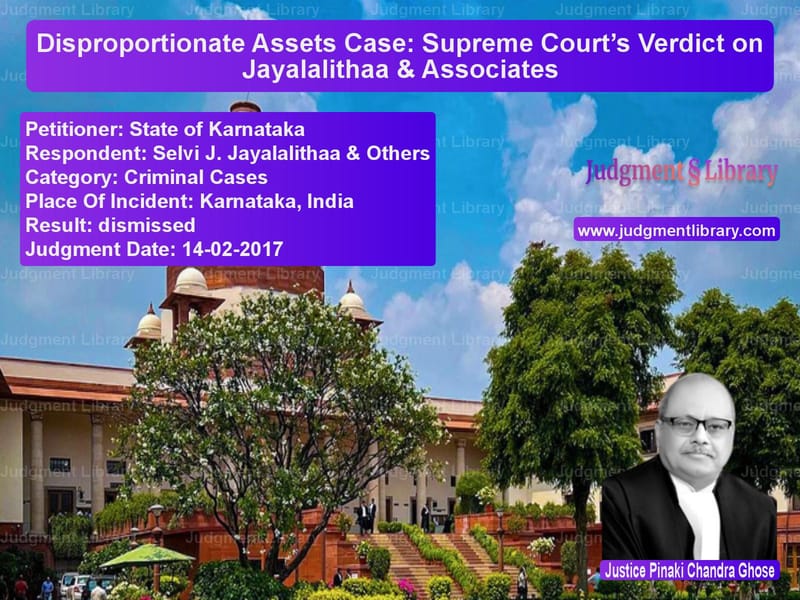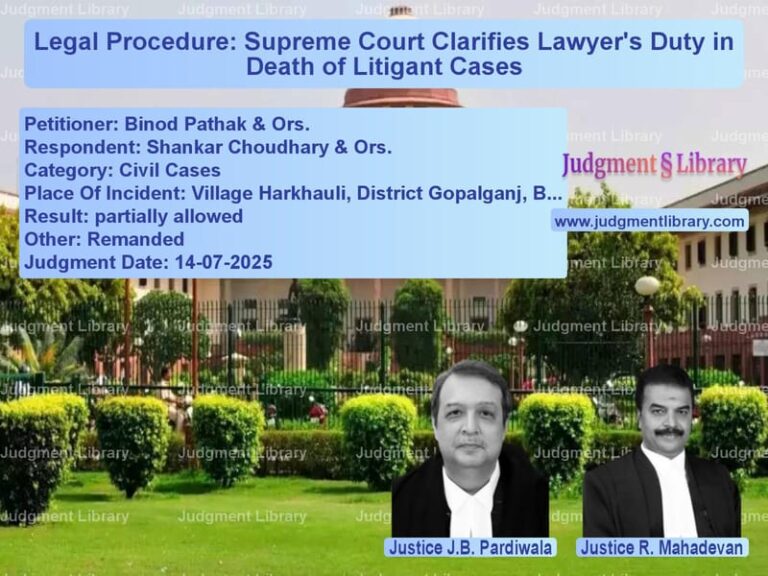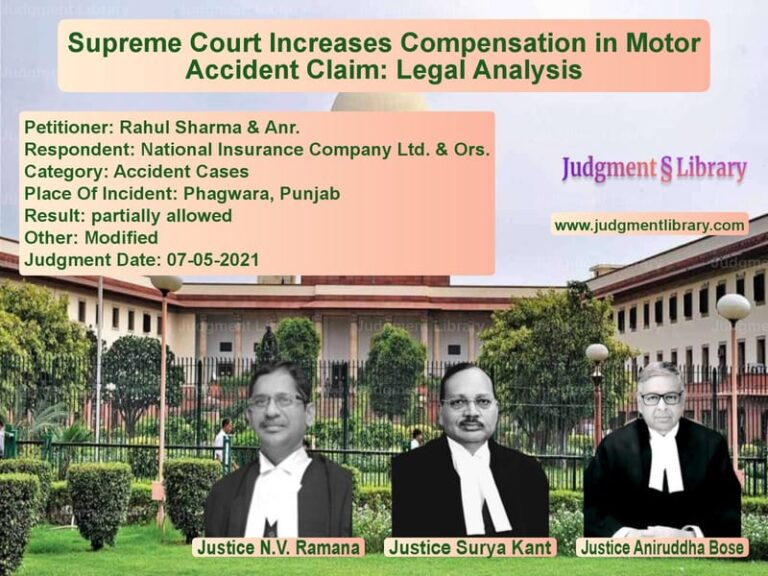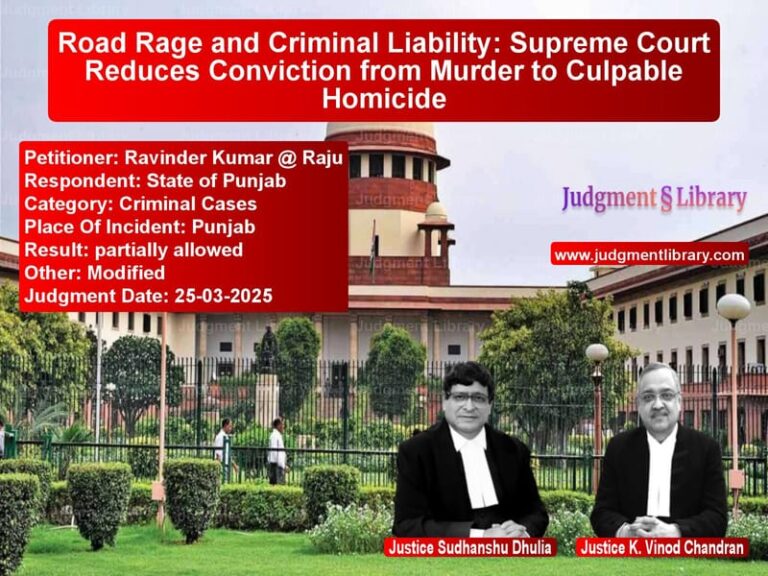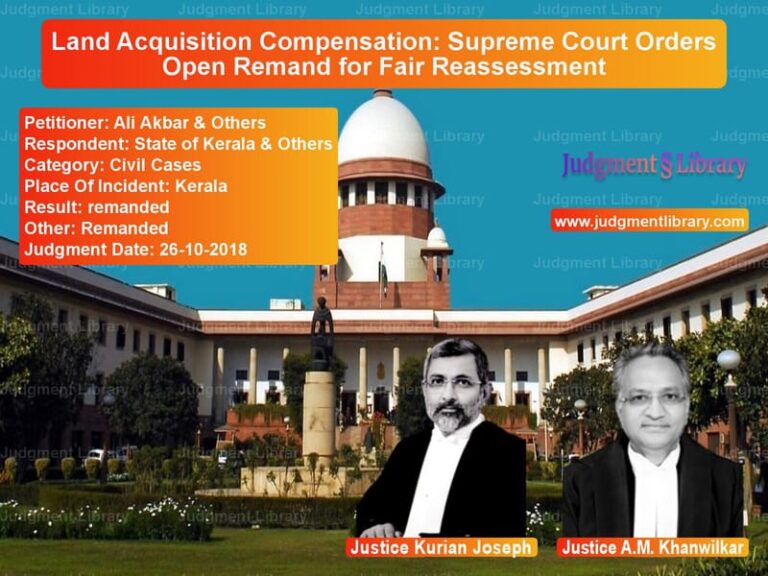Disproportionate Assets Case: Supreme Court’s Verdict on Jayalalithaa & Associates
The Supreme Court of India, in its judgment dated February 14, 2017, ruled on the case of State of Karnataka vs. Selvi J. Jayalalithaa & Others. This case was one of the most significant corruption trials involving a high-ranking public official in India. The core issue revolved around the accumulation of disproportionate assets by the late Chief Minister of Tamil Nadu, Selvi J. Jayalalithaa, and her close associates, including Sasikala Natarajan, V. N. Sudhakaran, and J. Elavarasi. The case, initially investigated in Tamil Nadu, was transferred to Karnataka to ensure a fair trial due to political influence in the home state of the accused.
The case stemmed from allegations that between July 1, 1991, and April 30, 1996, Jayalalithaa and her associates amassed wealth vastly disproportionate to their known sources of income. The prosecution, led by the State of Karnataka, presented documentary evidence showing that Jayalalithaa, while serving as Chief Minister, acquired properties, cash, jewelry, and business investments worth Rs. 66.65 crores, which was significantly beyond her legitimate earnings.
### Prosecution’s Arguments
The prosecution presented its case based on documentary evidence, witness statements, and financial records. Key arguments included:
– The accused persons acquired multiple properties and businesses in Tamil Nadu, Hyderabad, and other locations, far exceeding their legal income.
– The transactions indicated an elaborate conspiracy to conceal the true ownership of assets.
– Large sums of money were deposited in the bank accounts of firms associated with the accused, without any legitimate explanation.
– There was a clear violation of the Prevention of Corruption Act, 1988, which prohibits public officials from acquiring assets disproportionate to their known sources of income.
### Defense’s Arguments
The defense, led by senior advocates, countered these claims with the following arguments:
– The assets were accumulated through legitimate means, including business investments and loans.
– Some of the transactions attributed to Jayalalithaa were undertaken by her close aides without her direct involvement.
– The valuation of assets by the prosecution was inflated, leading to an erroneous conclusion that they were disproportionate.
– Jayalalithaa was a renowned film actress before entering politics, and her earnings from that period should have been considered in the total asset calculation.
### Supreme Court’s Observations and Ruling
After an extensive review of the evidence and legal arguments, the Supreme Court ruled against the accused. The key observations made by the Court were:
– “The burden of proof lies on a public servant to explain any disproportionate assets, and in this case, no satisfactory explanation was provided.”
– “Public officials must be held to the highest standards of accountability, and any unjust enrichment through corruption is unacceptable.”
– “Despite claims that businesses were independently run, financial records clearly established that Jayalalithaa and her associates benefited directly.”
– “The defense’s argument that valuation discrepancies led to incorrect conclusions does not negate the overwhelming evidence of corruption.”
Based on these observations, the Court upheld the trial court’s conviction of Sasikala, Sudhakaran, and Elavarasi, sentencing them to four years of imprisonment along with a substantial fine. However, since Jayalalithaa had passed away during the pendency of the appeal, the case against her was abated.
### Impact of the Judgment
The ruling set a crucial precedent in cases involving corruption among high-ranking public officials. Key takeaways from the judgment include:
– The reaffirmation that public officials must disclose and justify their sources of wealth.
– Strengthened legal precedent for holding politicians accountable under the Prevention of Corruption Act.
– A message to the political class that misuse of power for personal enrichment will not go unpunished.
### Conclusion
The Supreme Court’s decision in State of Karnataka vs. Selvi J. Jayalalithaa & Others reinforced the judiciary’s role as a guardian against corruption. The ruling underscored the importance of transparency in governance and set a benchmark for future cases involving disproportionate assets and corruption.
Don’t miss out on the full details! Download the complete judgment in PDF format below and gain valuable insights instantly!
Download Judgment: State of Karnataka vs Selvi J. Jayalalitha Supreme Court of India Judgment Dated 14-02-2017.pdf
Direct Downlaod Judgment: Direct downlaod this Judgment
See all petitions in Fraud and Forgery
See all petitions in Money Laundering Cases
See all petitions in Bail and Anticipatory Bail
See all petitions in Judgment by Pinaki Chandra Ghose
See all petitions in dismissed
See all petitions in supreme court of India judgments February 2017
See all petitions in 2017 judgments
See all posts in Criminal Cases Category
See all allowed petitions in Criminal Cases Category
See all Dismissed petitions in Criminal Cases Category
See all partially allowed petitions in Criminal Cases Category

